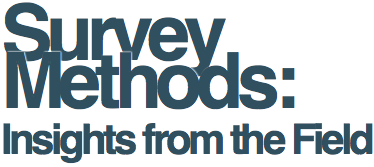Volume 2, issue 1 (2024)
A Multimode Strategy to Contact Participants and Collect Responses in a Supplement to a Longitudinal Household Survey
The Agency for Healthcare Research and Quality’s (AHRQ’s) annual Medical Expenditure Panel Survey (MEPS) collects data on Americans’ health care expenditures and use. In seeking to understand connections between these topics and social determinants of health, AHRQ and Westat conducted a new MEPS supplemental study in 2021 using a multimode (web and paper) instrument. All [...]
contact protocol, longitudinal research, MEPS, multimode, self-administered questionnaire, social determinants of health, web survey,
Designing Effective Mobile Phone Surveys: Insights from Mozambique on Optimizing Call Attempts and Evaluating Response, Refusal, and Contact Rates among Refugees and Asylum Seekers
This study aims to provide a detailed analysis of the call attempts and sample design phase in Computer Assisted Telephone Interviewing (CATI) when applied to forcibly displaced populations. The sampling frame consisted of 680 individuals from initial batch and 1400 individuals from the latter which was currently updated, all refugees and asylum seekers. Data was [...]
CATI, forced displacement, Mozambique, non-settlements, phone-surveys, Refugees, survival analysis, UNHCR,
Ten Hypotheses Generated for Increasing Survey Response Propensity Among Immigrants and Inhabitants of Socially Disadvantaged Areas
In democracies, surveys play a key role in policy decision-making. That immigrants and people living in socially disadvantaged areas are especially unlikely to participate in surveys might, therefore, lead to their opinions not being considered to the same extent as those of others. However, the mechanisms for nonresponse among these groups are relatively unknown, even [...]
Immigration, Internal political efficacy, Nonresponse, Socially disadvantaged areas, Survey self-efficacy,
Asking Volunteers: Pitfalls and Solutions for Surveying Voluntary Organisations in Germany
Volunteering is seen as an effective way to address a wide range of issues that are present in modern societies, in particular in rural areas. In order to gain insight into the current state of volunteering, a survey was carried out with the aim of providing an inventory of the digitalisation of volunteering and addressing [...]
Associations, Digitalisation, Register data, Rural areas, survey methods, Voluntary work,
Do Question Topic and Placement Shape Survey Breakoff Rates?
Survey breakoffs, or deliberate early terminations, are quite common and have the potential to reduce data collection efficiency and compromise data quality. Prior research has established that survey topics can influence participation rates, and conventional wisdom among practitioners is that more interesting questions should be placed at the beginning of questionnaires in order to increase [...]
breakoffs, COVID-19, experiment, Haiti, Non-response, survey topic,





